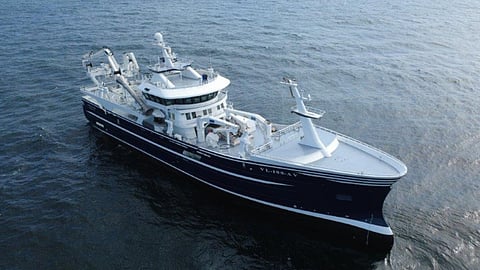VESSEL REVIEW | Knester – New Norwegian seiner/trawler to be deployed off Ireland’s west coast
Norwegian fishing company Knester has taken delivery of a new combination trawler and purse seiner built by Karstensens Skibsværft of Denmark.
The vessel, which is named Knester, replaces a 2007-built vessel in the owner's fleet. Construction of the hull took place at Karstensens Shipyard Poland and final outfitting was undertaken in Denmark.
Karstensens said the design work was undertaken in close collaboration with the owners, who had requested innovative solutions and emphasised optimising working conditions, safety and comfort for the crew.
Versatile propulsion setup and comprehensive deck equipment suite
Knester measures 75.2 by 15.6 metres (247 by 51.2 feet) and is powered by a hybrid arrangement that includes a Bergen B33:45L9P 5,400kW (7,200hp) main engine, a Marelli 3,200kW shaft generator, Caterpillar C32 940kWe and C18 565kWe auxiliary engines, and Brunvoll 1,400kW and 950kW side thrusters. Kongsberg meanwhile supplied the rudder and the steering system.
The Bergen main engine drives a Brunvoll Volda 4,200mm propeller and gear arrangement. Operating in diesel-mechanical mode will deliver a speed of 17.2 knots while diesel-electric mode will yield a speed of 11 knots.
The hull is made of steel with a main deck and a shelter deck as well as stern and boat decks with deckhouses. The wheelhouse, the funnel, and the fore and aft masts are aluminium.
The hull is built on a round frame with a transom and an almost vertical bow with the bulb above and below the waterline. The stern is meanwhile constructed with a kink line/bulb stem and skeg.
The key equipment includes a full selection of Karmøy winches and fish pumps, Storm cranes, a Markussens trawl block, a Cflow vacuum system, and RSW tanks from PTG FrioNordica. The pumps, winches and cranes are connected to a complete drive system with a total of 10 power packs.
Laid out for improved comfort during extended-duration sailings
The RSW tanks are kept in one of six watertight compartments below the main deck, though access to the tanks is possible from the shelter deck via hatches located amidships.
The other onboard facilities include stores, a machine shop, 13 crew cabins (including four cabins for the skipper and the other senior crew) all with en suite toilets, a hospital, laundry areas, a day room, a mess, a galley with provisions space, an exercise room, a cinema, a coffee bar, changing rooms, and an oil storage room with a shared toilet.
Design work on the interior spaces was provided by Maritime Montering, which also supplied some of the onboard furniture.
Karstensens said that by placing the interior as far away as possible from the propeller and other noise sources, the noise level in the vast majority of cabins is kept below 55 dB(A) when the propulsion is operating at 80 per cent MCR. A number of noise insulation features are fitted, thus further reducing the impact of outside noise on the interior spaces.
The interiors also feature Bohamet windows, Wynn wipers, Momec doors, and an LF Ventilation AC. The external lighting arrangement includes LED navigation lights from Den Haan and Polarlight searchlights.
The wheelhouse provides 360 degrees of visibility as well as four NorSap crew seats. The electronics suite includes radars, sonars, GPS and echosounders from Furuno, Hatteland displays, a Scantechnic switchboard, Sailor VHF radios, a Simrad autopilot, Marport and Mobrey monitoring systems, a Consilium fire alarm, MaxSea and Olex plotters, an intercom and CCTV cameras from SunnCom, and a DEIF power management system.
Should evacuation become necessary, the crew have access to two 16-person liferafts from Viking Life-Saving Equipment. Viking also supplied a fast boat for use in MOB rescues. This is launched and recovered using a dedicated davit.
The DNV-classed Knester will be operated off Ireland’s west coast, where it will primarily trawl for blue whiting. When purse seining, the vessel will focus on mackerel and herring.


